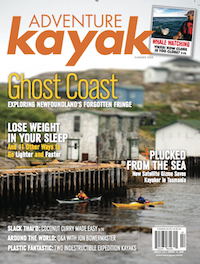“That looks like a good place to rest,” said Jacques Cousteau, while Mario Andretti and I pretended not to listen and continued our race to the campsite.
“Must keep going,” we grunted time and again. “No time to stop. Rest later.”
I am an inveterate impatient traveller. On my most recent kayaking trip I justified my abysmal behaviour by telling myself that Cousteau just preferred to paddle slowly and check out the sights while the rest of us charged forward. Surely he enjoyed shortcutting a kilometre offshore (which is why we secretly nicknamed him “Jacques Cousteau”) while we explored along the shore and waited for him at every headland. Of course, I never bothered to ask “Cousteau” how he felt.
It didn’t sink in how terribly I’d behaved until I was reading a blog, weeks later. Wendy Killoran and Rene Seindal are kayakers from different countries who tried, and bitterly failed, to paddle together around Sardinia last fall. Rene’s blog entry about what went wrong contemplates the importance of information sharing, mutual respect and patience that are integral to any expedition partnership.
Rene also slams the ultimate in disrespectful behaviour, “mock waiting.” Mock waiting means waiting just long enough for a slower paddler to get within a comfortable distance, then taking off before he has a chance to fully catch up and rest. I guiltily realized I knew exactly what Rene was talking about.
“Mock waiting is very destructive behaviour in a team,” Rene writes. It constantly underlines that ‘I’m faster and you’re slower,’ while it wears the slower paddler down physically too. It can drive the slower paddler into the ground, physically and psychologically.”
It further occurred to me that leaving someone in your wake highlights and abuses a power imbalance. Once you get far ahead of someone, it can be almost impossible for them to catch up unless you let them. Slowness gets compounded by wind and cur- rent, so a slower paddler will fall increasingly far behind and effectively be paddling farther through the water to get to the same destination. In other words, just as the rich get richer, the slow get slower.
I decided I don’t ever want to cause a Jacques Cousteau dynamic again. So I phoned for some expert advice from SKILS guiding school in Ucluelet, B.C. Instructor J.F. Marleau told me what should have been obvious. He said that when paddling with peers, you should first carefully choose partners with matching abilities, then make sure everybody has the same expectations for the trip, and communicate about any issues that arise.
A good way to do this is to start with a trip contract, which means sitting down with everyone before you leave to reach consensus on issues like how fast to travel, when and where to take rest breaks, what paddling conditions are unsafe, what to do if the group gets separated, how to communicate and resolve problems, and anything else that anyone in the group wants to lay down as a ground rule.
On my next trip I’m going to make a contract, and clause number one will be about paddling speed. I can already look back and remember all sorts of problems that this would have avoided. Like the first long paddling trip with my wife when we realized halfway through that only one of us cared at all about how far we paddled each day (hint: she wasn’t the one measuring the map distances with dental floss in the tent each night).
And while I’m at it maybe I’ll work on being a better communicator at home and at work. Because good expedition behaviour is really no different from good behaviour in everyday life. Nobody can be perfect, but a kayaking trip has a powerful way of showing you where to improve.




